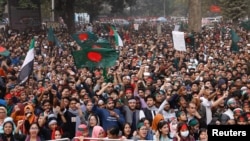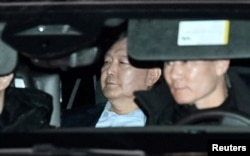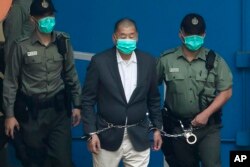In an uneven year for democracy and rights globally, the Asia-Pacific region saw some encouraging signs, Human Rights Watch says in its World Report 2025, released today.
The organization cited citizen action by Indian voters against Prime Minister Narendra Modi, the toppling of Bangladeshi Prime Minister Sheikh Hasina by students, and a people’s protest blocking a bid by South Korean President Yoon Suk Yeol to disempower political opponents by using martial law.
However, at the same time, Myanmar’s junta continued to jail and bomb its opponents nearly four years after it seized power from the elected government; in Afghanistan the Taliban rolled back years of gains on women’s rights; and China, under President Xi Jinping, continued its descent into repression, the New York-based group said in the report.
Taken together the message is clear, according to HRW Executive Director Tirana Hassan.
“When rights are protected, humanity flourishes,” she said in her introductory essay.
"When they are denied, the cost is measured not in abstract principles but in human lives. This is the challenge — and the opportunity — of our time," she said.
Bangladesh
In Bangladesh, Hasina was ousted and fled the country amid student-led protests in August after 15 years of increasingly repressive government.
Supporters of her Awami League party and police attacked peaceful demonstrations by students initially aimed at a government job quota plan, the HRW report said. The crackdown imposed an internet blackout and a curfew with a “shoot-on-sight" order.
“Nearly 1,000 people, including over 100 children, were reportedly killed in the violence in July and in reprisal violence after Hasina’s ouster,” the report said.
The report adds that since Hasina fled, the interim government of Nobel laureate Muhammad Yunus has released thousands of people who were detained during the protests, restored order and set the country back on the path toward democratic elections.
Accountability is at the heart of Yunus’ efforts, with the U.N. High Commissioner for Human Rights invited to send a fact-finding team to investigate abuses during the protests and their root causes, HRW reported.
India and South Korea
Another example of what the rights organization called “meaningful democratic resistance” occurred in June in neighboring India, the rights organization said, as voters turned away from the populist and often anti-Muslim rhetoric of Prime Minister Narendra Modi, denying him an electoral majority.
That showed “that even in the face of systemic challenges, democracy can still put a check on power,” Hassan said.
As the year ended, South Korea’s president, Yoon, stunned the world with a declaration of martial law to fend off mounting discontent with his administration, but the move backfired as thousands marched on the National Assembly, which overturned the decree a few hours later as the specter of a coup quickly evaporated.
“These resistance movements highlight a crucial reality,” Hassan said.
“The fight for rights is often driven by ordinary people, fed up with injustice and corruption, bringing together their collective power to compel governments to uphold basic rights and serve the people, instead of their own interests.”
China and Hong Kong
Xi’s China took the opposite turn in 2024, according to HRW, which said a slumping economy has seen “heightened repression throughout the country,” from the jailing of hundreds of thousands of Uyghurs to the decline in civil liberties in Hong Kong.
“There is no independent civil society, no freedom of expression, association, assembly or religion, and human rights defenders and other perceived critics of the government are persecuted,” the report said.
As China’s economy loses steam, Xi has intensified his smothering of dissent, including by the arbitrary detention of economists, artists and civil society leaders, the study said.
Hong Kong’s handpicked judiciary tightened controls, HRW said, with 14 activists and former lawmakers jailed for four to 10 years for “conspiracy to commit subversion” because of organizing an unofficial primary poll in 2020.
Media freedom took more hits with the ongoing trial of outspoken 76-year-old tycoon Jimmy Lai, under national security laws and the jailing of two journalists in September for 21 and 11 months, respectively, for alleged sedition.
“While foreign governments recognize the Chinese government’s worsening rights record, they have not confronted Beijing,” the report said.
Afghanistan
Rights were stripped from women and girls in Afghanistan last year, as a resurgent Taliban banned secondary and university education and restricted employment and free movement of women.
An August law promoting “virtue and preventing vice” banned women from traveling or using public transport without a male companion.
“Under the law, women and girls are required to cover their faces in public and are prohibited from singing in public or letting their voices be heard outside the house,” the report said, adding women and girls had been detained for alleged breaches of draconian new dress codes.
Myanmar and Singapore
Meanwhile, in Myanmar, the junta continued to pound civilian areas with airstrikes and artillery and jail opponents, while it forced young conscripts into an army facing heavy losses across the country.
HRW noted the International Criminal Court’s issuance of an arrest warrant for junta leader Min Aung Hlaing for crimes against humanity committed in a crackdown on Rohingya Muslims in 2017. But enforcement of ICC warrants is “an ever-present hurdle” making “consistent support of ICC member countries, [which] is critical for securing justice, almost always a long game,” the report said.
Across Southeast Asia, HRW underlined Singapore’s continued use of the death penalty, mainly for drug offenses, and the limits of Thailand’s democracy after the 2023 election-winning Move Forward Party was dissolved by the courts in August.
“Prime Minister Paetongtarn Shinawatra has done little to improve respect for fundamental freedoms and resolve outstanding human rights problems,” the report said, although it pointed to Thai recognition of same-sex marriages, the first such move in the region, as “one positive step.”







